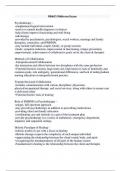NR605 Midterm Exam Psychotherapy – -nonpharmacological intervention -used to tx mental health diagnoses or distress -help clients improve functioning and well -being -talk therapy -provided by psychiatrists, psychologists, social workers, marriage and family therapists, counselors, and PMHNPs -may include individual, couple, family, or group sessions -Goals: symptom reduction, improvement in functioning, relapse prevention, empowerment, achievement of collaborative goals set by the client & therapist. Methods of Collaboration - Intraprofessional Collaboration -the interaction and efforts between two disciplines with the same profession • Potential barriers: tension, large team size, high turnover, lack of familiarity and common goals, role ambiguity, generational differences, and lack of undergraduate nursing education on intraprofessional practice. Transprofessional Collaboration -includes communication with various disciplines: physicians, physical/occupational therapy, and social services, along with others to ensure care is delivered safely • Potential barrier: lack of training Role of PMHNPs in Psychotherapy – -unique, full -spectrum approach -may provide psychotherapy in addition to prescribing medications -providing client and family education -coordinating care and referrals as a part of the treatment plan -provide psychotherapy in a variety of ambulatory, emergency department, inpatient, and outpatient settings Holistic Paradigm of Healing – -holistic model of care with a focus on healing -Holistic therapy respects the complexity of each unique individual • appreciating the relationship between the client's mind, body, and spirit • recognizing the interdependence of all parts of the human system -Foundational to healing is the relationship between the client and therapist • Emotional connection in the relationship is critical to the success of psychotherapy • PMHNP approaches the nurse -client relationship with acceptance, empathy, patience, and kindness to create a space for healing -psychotherapy can help the individual accept dysregulation and disharmony in the present moment • achieves acceptance of the present, they may be able to let go of resistance, relax, and release fears Theoretical Models in Psychotherapy - Maslow's Hierarchy of Needs Health Belief Model Transtheoretical Model of Change Maslow's Hierarchy of Needs - framework for understanding client motivation -first four levels of need in the hierarchy (physiological needs, safety, love and belonging, and esteem) are sometimes referred to as deficiency needs (D -needs) • Motivation decreases once D -needs are met -highest level of need, self -actualization, is considered a growth or being need (B -
need) • Once D -needs are met, clients can focus on self -actualization and personal growth • As the B -need is met, motivation for further growth increases self-actualized person - is self -fulfilled -Qualities exhibited by the self -actualized person include independence, autonomy, creativity, and maturity Maslow's Hierarchy of Needs Pyramid - TOP: Self -actualization -Morality, creativity, spontaneity, lack of prejudice, acceptance of facts Esteem -Self-esteem, respect, achievement, confidence Love/Belonging -Friendship, family, intimacy, sense of connection with others Safety -Security of body, of employment, of resources, of morality, of the family, and of health, of property Bottom: Physiological -Air, food, water, shelter, clothing, sleep Health Belief Model – -used to explain and predict health behaviors -a person's belief about a perceived threat of illness combined with belief in the effectiveness of the recommended action predict the person's willingness to change -constructs: • perceived seriousness • perceived susceptibility • perceived benefits of treatment • perceived barriers to treatment • cues to action • self -efficacy Transtheoretical Model of Change - assumes that behavior changes take place over time and that people move through stages of decision -making to make changes to behavior -stages: • precontemplation • contemplation • preparation • action • maintenance Nancy is a 64 -year-old who is wondering if losing weight might benefit her self -
esteem and self -confidence. Based on the transtheoretical model of change, which of the following actions by the PMHNP would be appropriate for Nancy if she is in the contempla tion stage of change? Ask Nancy to create a list of reasons that she wants to lose weight. Refer Nancy to her primary provider to obtain medical clearance for an exercise program. Explore Nancy's anxiety and emotional responses related to be - Ask Nancy to create a list of reasons that she wants to lose weight. Rationale: Creating a list of reasons to lose weight would be appropriate for the contemplation phase. Obtaining medical clearance for exercise is a part of the preparation phase of the Transtheoretical Model of Change. Exploring emotional responses to bei ng overweight would be appropriate for the precontemplation phase. Addressing rewards for reinforcement of behaviors would occur in the action phase. Treatment Hierarchy Framework - therapeutic aims at the base of the model must be addressed before the client can move up the triangle Top: Stabilization Internal resources External resources Bottom: Foundational needs strategies to support resource development and stabilization: - -case management -provision of safety -stress management -management of physiological arousal -exercise -cognitive or dialectical behavioral therapy -role play Processing - involves helping clients explore the meaning of adverse life events -adapting memory, cognition, behavior, affect, and beliefs surrounding traumatic events • achieve positive change Cultural Considerations - Culture shapes one's perceptions, attributions, emotions, and judgments in ways that are both conscious and unconscious -PMHNP must consider ethnicity, religion, race, class, cultural identity, and the cultural explanations of illness to effectively diagnose and treat mental health conditions -Outline for Cultural Formulation includes an assessment of the following categories: • cultural identity of the individual • cultural conceptualizations of distress • psychosocial stressors and cultural features of vulnerability and resilience • cultural features of the relationship between the individual and clinician




